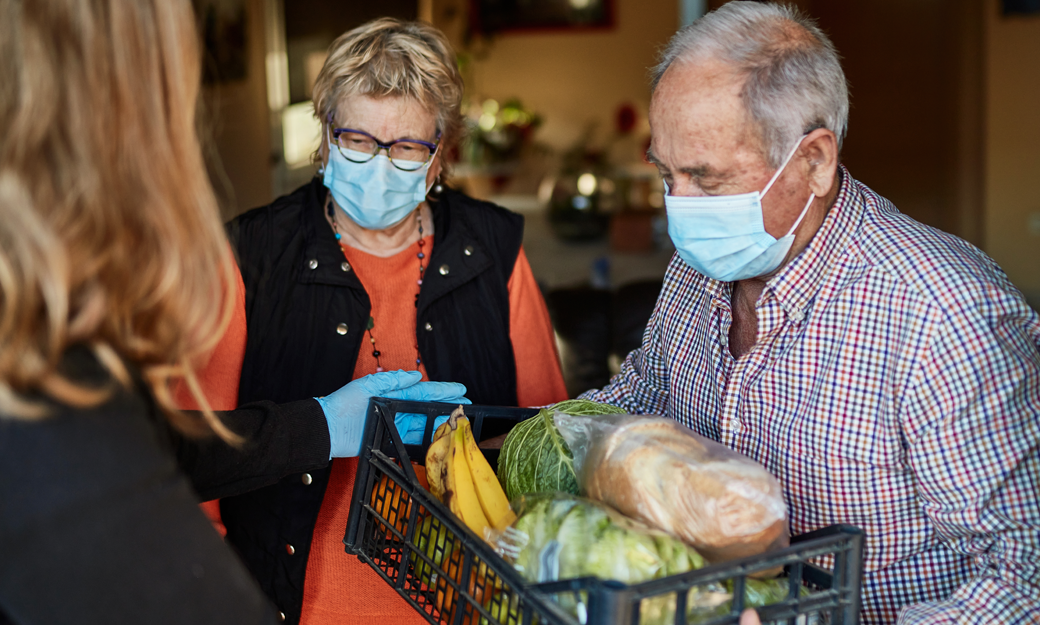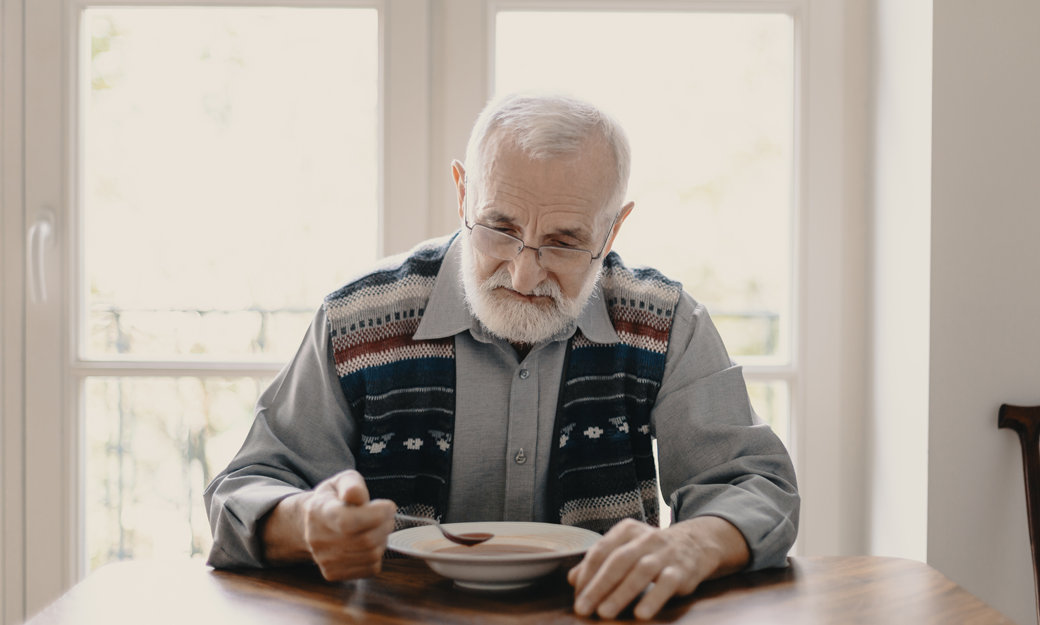View from our partners: Scottish charity Food Train on the impact of the pandemic on older people’s nutritional status and health
How has Food Train adapted its 'Eat Well Age Well' programme to support older people's needs during the pandemic?
Almost overnight older people (defined as 65 years and over) were told to shield, not leave their homes and were forced to rely of wide range of community and neighbourly support. Physical food access became an immediate challenge, especially for those without friends or family to provide support and for many without internet access, making it impossible for them to access one of the limited online shopping delivery slots. This, combined with significant food supply issues created a fragile and concerning situation. As well as challenges with physically accessing food, shielding meant a significant reduction in in-person social interaction for many older Scots, for many single-person households this meant seeing no-one!
Food Train’s mission, for the past 26 years, has been to support older people across Scotland by helping them live well at home. This is primarily through a range of services including a grocery shopping and delivery service (for a small customer fee), volunteer befriending and neighbourhood meal sharing. Food Train are reliant on the hard work and dedication of staff and volunteer teams across the country. As well as an increase in demand for Food Train’s support, overnight Food Train saw many volunteers standing down and self-isolating due to age and health reasons. There were additional challenges with accessing PPE and ensuring continued safety of staff and volunteers. (For more information about the initial response, read this article about COVID-19 and Food Train for Policy Scotland).
As an organisation we have branches covering nine regions across Scotland, as well as national projects, Meal Makers (a national meal-sharing project) Eat Well Age Well- a national project working to tackle malnutrition (as undernutrition) amongst older adults. During lockdowns staff were deployed on service delivery across Scotland, a significant recruitment drive took place to recruit volunteers and hard work, dedication, and commitment was shown, ensuring the 80% increase in demand for the grocery delivery service across Scotland was met.
Food Train work to support all older Scots and therefore rapidly increased the development of its new service – Food Train Connects – as the pandemic initially hit. Due to funding, Food Train does not currently have branches across all areas of Scotland – but Food Train Connects aims to connect any older person, who would like a little extra practical or social support with a local volunteer in their community. This meant whether an individual fell in a branch area or not – Food Train could provide them with shopping or social support, hopefully alleviating some of those initial challenges around food access and loneliness and social isolation. Since launching in June 2020, 156 older people have signed up to Food Train Connects and 1,044 deliveries of groceries and food have been made spanning 12 regions of Scotland (not covered by a Food Train branch). Over this last year, our geographical reach has spread from nine to 21 regions of Scotland.
What is the biggest challenge faced by older people in Scotland when it comes to food and health?
In March 2020, prior to the start of the pandemic, a survey conducted by Eat Well Age Well with community organisations working to support older adults across Scotland asked- what was the biggest challenge faced by older people in Scotland. 93% of respondents identified social isolation. As lockdown began Food Train started social calls for all members – a check in – to provide connection but also the opportunity to refer to other services if required. During the period April to September 2020 10,000 calls were made. This was hugely popular, and now forms part of an ongoing service, as part of Food Train Connects. Following government guidelines meal-makers cooks and diners stopped sharing meals in person, but where possible and appropriate cooks were able to continue to support their diners with shopping support, meals and social connection.
Malnutrition is largely preventable and treatable, but even prior to the start of the pandemic malnutrition was regularly undetected, untreated and unrecorded. Isolation is a known risk factor for malnutrition, along with challenges in physical food access, access to care around meals, and lack of community support – all of which were disrupted in the pandemic. Although many organisations adapted and redesigned services – for instance door stop drops, befriending phone calls, these are not a replacement for the face-to-face interaction.
What’s the scale of the problem when it comes to malnutrition among older people in Scotland?
Due to the absence of routine screening for malnutrition in the community it is difficult to evidence the impact of these factors on malnutrition prevalence levels prior to and during the pandemic. However, with many people still feeling hesitant and continuing to shield, the pandemic’s impact on risk of malnutrition is likely to be felt for a while yet. Eat Well Age Well along with other members of the UK Malnutrition Awareness and Prevention Network, including the University of Hertfordshire wrote to the Health Secretaries across the UK, raising concerns about the impact of the pandemic on malnutrition risk for older adults.
The latest community-based data, from the Malnutrition Task Force, estimates 1 in 10 people living in the UK over the age of 65 are malnourished or at risk of suffering from preventable malnutrition, which equates to 103,00 older people in Scotland, (National Records of Scotland, 2018). However, Eat Well Age Well’s prevalence data gathering suggests this figure is in fact higher, with around 30% of vulnerable older people being at risk of malnutrition living in the community, in Scotland. With those aged 65 years and above predicted to make up a quarter of Scotland’s population by 2041 these figures are only going to worsen with an ageing population. (National Records, 2017)
What does the future look like for older people in Scotland?
Nearly 18 months on, March 2020 seems a long time ago, but only yesterday at the same time. As of June 2021 Food Train’s grocery delivery service demand remains at a 50% increase from pre- pandemic (prior to March 2020) levels. As restrictions ease, many customers remain hesitant about returning to a previous ‘normal’. Food Train will still be here supporting older adults across Scotland.
After being seconded to support direct service-delivery in the initial months, as well as providing an emergency fund to support organisations to support older adults to continue to eat well, The Eat Well Age Well project has moved into phase two. The project is now funded by Scottish Government, taking learning from the first phase to tackle malnutrition at a country wide level, particularly as many social risk factors remain heightened by the pandemic (see below). Food Train works at multiple scales and is part of this wider systematic change, looking to the future, to building a more sustainable, just and fairer food system that recognises all.
Food Train will continue to support older adults across Scotland to eat well, age well and live well, as well as being an advocate for much needed policy change, that recognises the importance of food across policy areas, including social care, public health and ensure Scotland is a place “people are healthy, happy and secure in older age” and malnutrition, food insecurity and social isolation and loneliness are not a prevalent part of the ageing experience.
What initiatives would you like to see put in place to help reduce the risk of malnutrition amongst older people?
Eat Well Age Well have listened, tried and tested and worked with older people across Scotland, developing four simple calls to action, that if implemented, would make a significant positive difference to older people’s lives, whilst reducing the risk of malnutrition. They are:
- Screening for malnutrition should be mandatory for all statutory agencies with a role in supporting older people.
- Training on malnutrition, unintentional weight loss and health communication about household food insecurity should be embedded into basic training for all health and social care professionals.
- More and better investment should be made in community initiatives that address social isolation in communities by providing befriending and opportunities for people to eat, shop or cook with others.
- Food poverty and food insecurity are not the same for vulnerable older people. Policy, practice and research needs to take this into account.


